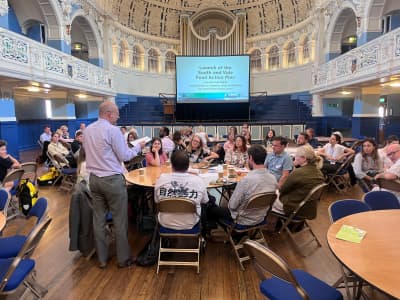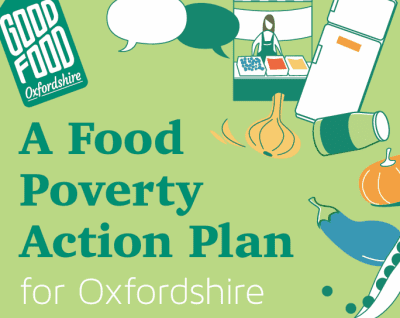The
latest IPCC special report was released earlier this month with the mouthful of a title "
Climate Change and Land: an IPCC special report on climate change, desertification, land degradation, sustainable land management, food security, and greenhouse gas fluxes in terrestrial ecosystems" (SRCCL). It has sparked a flare of discussions around the role of farming and food in mitigating climate change.

Land is already under growing human pressure and climate change is adding to these pressures. At the same time, keeping global warming to well below 2ºC can be achieved only by reducing greenhouse gas emissions from all sectors including land and food, the Intergovernmental Panel on Climate Change (IPCC) said in its latest report.
A
detailed response from Sustain, the alliance for food and farming, emphasises that business as usual is not an option and that while there is no "silver bullet", many solutions are already available and being practiced in the Good Food sector.
"A key step would be to support agro-ecological systems and end harmful subsidies of big single crops (such as corn, sugar cane, soy) and fossil fuels. Strong measures are also necessary to eliminate food waste, support a transition to balanced diets with more plants and less and better livestock, halt deforestation, restore damaged ecosystems and use indigenous knowledge to protect and foster ecosystems," says Vicky Hird, Sustainable Farming Campaign Coordinator for Sustain.
The
Soil Association in their response mentions regenerating soils through organic and agroecological farming methods as one of the key recommendations of the report. Other crucial strategies that they highlight include better government support for farmers and changing diets to significantly less and better meat.
Researchers at the University of Oxford have found that while grazing livestock have their place in a sustainable food system, that place is limited. The report
Grazed and Confused concludes that while "well-managed grazing in some contexts can cause carbon to be sequestered in the soil (...), at an aggregate level the emissions generated by these grazing systems still outweigh the removals. Even assuming improvements in productivity, they simply cannot supply us with all the animal protein we currently eat." The report also questions whether the production of animal products should be expected to meet "the demands of high consuming individuals in affluent countries".
Putting a real price on resource intensive products and treating them as the luxuries that they truly are would lead to a reduction in consumption.
Whether the need to drastically reduce consumption of animal products means biting the carrot and going fully vegan or vegetarian, or reducing to eating red and processed meat just once per week, it has never been easier to do this than now. Our website holds a
plethora of inspiration for eating better and more sustainably, from cooking with vegetables with the
Good Food Cooking Toolkit or buying locally-grown produce at a farmers' market to volunteering at a community garden. As climate change makes farming more risky, and is expected to lower yields and raise food prices, it becomes ever more important to focus on diverse and decentralized food production, from urban gardens to local family-owned farms. There are now also various apps available for finding
sustainable places to eat out or
rescuing surplus food from the bin.
On the policy level, the main conclusions from the IPCC report are increasing incentives for ecological farming systems as well as harnessing the opportunities in public procurement to support healthier and more sustainable diets and the livelihoods of local farmers and growers.
Nationally, we support the work of Sustain and other charities demanding that the
Agriculture Bill truly delivers "public goods", meaning good food for everyone. We would like to see the use of a calculator like
Cool Farm Tool being incentivised through the subsidies system for use on-farm.
Locally, we support Oxfordshire's institutions to deliver healthier and more sustainable food through our
Catering & Procurement Working Group. We would like to see the
Government Buying Standards Framework or other similar assessment framework used as standard in all Oxfordshire institutions.
And at the intersection between local and national, we are delighted that the
Oxford Real Farming Conference will be entering its second decade here in Oxford in January 2020, showcasing the best of agroecological farming both nationally and internationally. Once again we are proud to be working with ORFC to deliver the evening dinners: delicious well-sourced food and a meal to remember.
A plea: much of our work is currently unfunded, so we rely on earned income and your donations. If you value our work and want us to keep driving the sustainable food agenda for Oxford and Oxfordshire, please consider making a one-off or regular donation to Good Food Oxford through our secure platform, Donorbox.
 Land is already under growing human pressure and climate change is adding to these pressures. At the same time, keeping global warming to well below 2ºC can be achieved only by reducing greenhouse gas emissions from all sectors including land and food, the Intergovernmental Panel on Climate Change (IPCC) said in its latest report.
A detailed response from Sustain, the alliance for food and farming, emphasises that business as usual is not an option and that while there is no "silver bullet", many solutions are already available and being practiced in the Good Food sector.
Land is already under growing human pressure and climate change is adding to these pressures. At the same time, keeping global warming to well below 2ºC can be achieved only by reducing greenhouse gas emissions from all sectors including land and food, the Intergovernmental Panel on Climate Change (IPCC) said in its latest report.
A detailed response from Sustain, the alliance for food and farming, emphasises that business as usual is not an option and that while there is no "silver bullet", many solutions are already available and being practiced in the Good Food sector.



